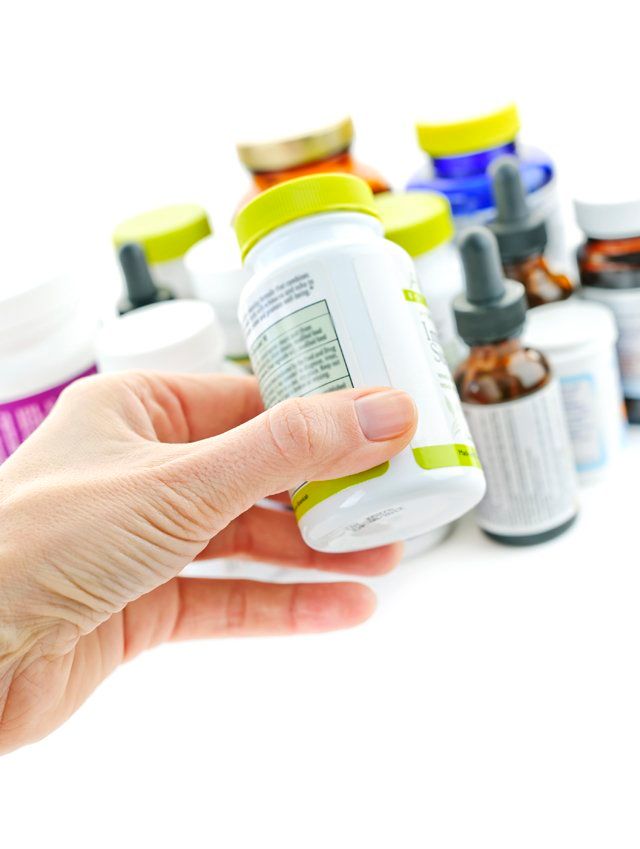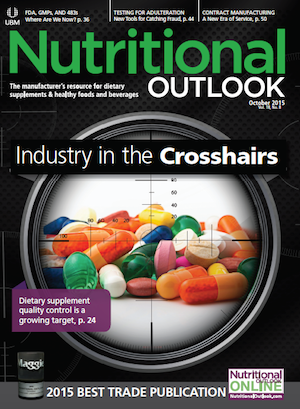Should the Dietary Supplements Industry Follow the Drug Industry in One Way (Not Premarket Approval)?
The U.S. supplements industry has lost some credibility with media and consumers. Could a proposal based on the pharmaceutical industry that is not premarket approval help to alleviate concerns?
Drug-like premarket approval may not make sense for supplements, but a system mimicking drug-code labels might.

By Mark A. LeDoux, Natural Alternatives International Inc.
The past several months have seen a lot of activity in the dietary supplement industry in the United States. One of the precipitating events that caused significant media attention was the Office of the Attorney General of New York’s (NY AG)
issuance of cease-and-desist orders to four retailers in his state
, presumably to remove herbal extract products that did not meet label claims. These retailers are national chains, so the NY AG’s actions immediately got some serious press coverage. Supplement industry leaders have largely criticized the Attorney General’s office, which, in its investigation, contracted with a Canadian firm to initiate DNA testing on finished herbal extract products-
a method which has not been widely used or validated by industry in the United States
, and, frankly, elsewhere.
As of this date, one retailer has negotiated out of the cease-and-desist and has resumed selling products. Some in industry believe that the settlement with the NY AG was premature; others believe it was a reasonable action in light of mounting class action lawsuits filed against the several targets of this investigation. The ensuing discussions in the press, the concerns expressed by doctors and media alike regarding the “unregulated” industry, reached a cacophony of sorts, and the resultant impact has been a reduction of consumer confidence, as measured by a recent Nutrition Business Journal study.
It is not my intent to cast opinion or judgment on the players in this drama, but rather to suggest a way to help alleviate the ongoing lament of often ill-informed media that the dietary supplement industry is unregulated by FDA. Those of us in industry know this is not the case, as do the recipients of warning letters and recall notices by the agency. The consumer does not know this, however, and therein lies the difficulty in assuaging consumer concerns and restoring credibility.
The facts are as follows:
- FDA, the agency tasked with oversight, is probably undermanned and under-resourced to oversee the evaluation of this burgeoning industry at the production and supply chain level.
- The areas of enforcement oversight of Good Manufacturing Practices requirements (21 CFR 111) seem to vary widely between inspectors and districts.
- There are too many Form 483s (noting GMP infractions) and too many warning letters being issued-often which take over a year to get issued from the bureaucracy in Washington.
- The industry has a credibility problem with the consumer and now with influential lawmakers and regulators.
- It is time for a commonsense solution involving premarket notification or registration with an appropriate agency.
Could the National Drug CodeServe as a Role Model?
Consumers want to believe that the supplements they use are safe, pure, effective, and unadulterated. I choose my words carefully, because that is the type of language that FDA utilizes when it discovers a serious problem with a product in the field. So how can we deliver the assurance of safety, purity, and efficacy? A system implemented by the pharmaceutical industry could hold the answer.
When one goes to purchase over-the-counter medication, on every consumer package is a code number that ties directly into a database managed by FDA. This is called the National Drug Code, or NDC Labeler Code (NDC). On a bottle of Aleve (naproxen sodium) or a generic version thereof, one finds on the front label of the container the following (using two generic versions sourced at Costco and Walgreens as examples):
- NDC 0113-0368-79 – Kirkland Signature Naproxen Sodium Tablets (Made by Perrigo for Costco
- NDC 0363-0714-40 – Walgreens Naproxen Sodium Capsules (Softgel Capsules)
So what is this NDC Labeler Code number, and what does it mean?
The NDC Labeler Code is a 10-digit, unique, three-segment number that serves as a product identifier for human drugs. The NDC will be in one of the following configurations: 4-4-2, 5-3-2, or 5-4-1.
The first segment of the NDC Labeler Code identifies the establishment; FDA will assign this number, and it will be unique to each establishment (manufacturer, packer, labeler, etc.). The second segment of the NDC Labeler Code identifies the drug (strength, dosage, and formulation). The third segment of the NDC Labeler Code identifies the package size and package type. The second and third segments are assigned by the labeler. An assignment of a NDC number does not denote FDA approval of the product.
It became clear to me that a system not unlike the NDC Labeler Code could be envisioned for the dietary supplement industry in the United States.
I would suggest the time is right to develop a National Dietary Supplement (NDS) Labeler Code system, which would identify each establishment (manufacturer, packer, labeler, etc.) and identify the dietary supplement itself, and the final part of the code would identify the package size and type. Each NDS Code would be unique to each product, because even in commodity products such as vitamin C 500-mg tablets, the manufacturer, packer, labeler, etc., would be clearly spelled out in code within the NDS number. At a point in time sufficient to allow for label compliance and stock conversion, failure to list the NDS number will render the product mislabeled under statute and subject to market withdrawal either voluntarily or via justifiable seizure.
This database would be paid for by industry with nominal user fees, so the end result would be that products would properly appear to be registered with the FDA or some other U.S. government entity if the FDA is not the proper agency to manage this. A centralized database could be accessible to government authorities interested in tracking products that demonstrated a postmarket problem, as well as to consumers, physicians, and industry, just as it is now with the NDC system.
The objective here is twofold:
- Eliminate the shrinkage in consumer confidence by publicizing the premarket notification or registration requirements after a date certain for implementation
- Eliminate the incorrectly stated mantra that the dietary supplement industry in the United States is unregulated, notwithstanding the fact that we labor under numerous regulations, including NLEA, DSHEA, FSMA, Bioterrorism Act registration, AER reporting, etc.
No Need for Premarket Approval
There is no need to amend the Dietary Supplement Health and Education Act governing supplements to include premarket approval. There is clearly no need to open Pandora’s Box, but there is a need to restore consumer confidence, and I believe the time is right to initiate the creation of the National Dietary Supplement Registry with leaders in the responsible dietary supplement industry.
Here is what I believe are appropriate steps necessary to achieve this goal:
- Identify the top 15 companies in the U.S. marketplace and seek their support for this activity. To date, we have positive feedback from DSM Nutrition, Glanbia Nutrition, Herbalife International, Natural Alternatives International, Chromadex Corporation, and The Juice Plus+ Company, and expressions of interest from others as well, including NBTY.
- Create a system patterned after the NDC system to discuss with industry and get their feedback, suggestions for amendments, and support
- Inform the various trade associations of this endeavor and advise them that the industry leaders are supporting this effort and ask for their support as well. Support would be beneficial but not mandatory, because it is doubtful all four trade associations will support this endeavor.
- Discuss with former FDA personnel to make certain key bureaucratic language is inserted to make the agency accountable for this (e.g., funding, timing for providing the NDS code, tracking, enforcement)
- At the appropriate time, enlist the services of well-placed media to carry the message to the consumer and to the interested parties on Capitol Hill who will be needed to secure this legislation
- Identify key Senators and Congressional members and staff to enlist their feedback and support
This is an idea whose time has come. After a certain date prescribed by legislation for the system to take effect, it will become important to advertise that products without the NDS code are presumed to be illegal and as such should be avoided. This will also require training of retailers as well as distributors who will not want to be subjected to unnecessary legal issues. Finally, the news media and the print, radio, and television/cable outlets need to be advised that airing or printing commercial content for dietary supplements without the appropriate NDS Code will result in financial penalties to them for aiding and abetting consumer fraud.
Let’s give the attorneys general an opportunity to help police the marketplace by searching for illegal or contraband product rather than go through what we have experienced since February following the NY AG investigation.
I welcome your feedback and comments.
Mark A. LeDoux is chairman and CEO of Natural Alternatives International Inc. (San Marcos, CA).
Also read:
Editorial: Turning Up the Volume on Dietary Supplement Quality Control
Should FDA’s Dietary Supplement GMPs Include Ingredient Suppliers?

HHS announces restructuring plans to consolidate divisions and downsize workforce
Published: March 27th 2025 | Updated: March 27th 2025According to the announcement, the restructuring will save taxpayers $1.8 billion per year by reducing the workforce by 10,000 full-time employees and consolidating the department’s 28 divisions into 15 new divisions.




















